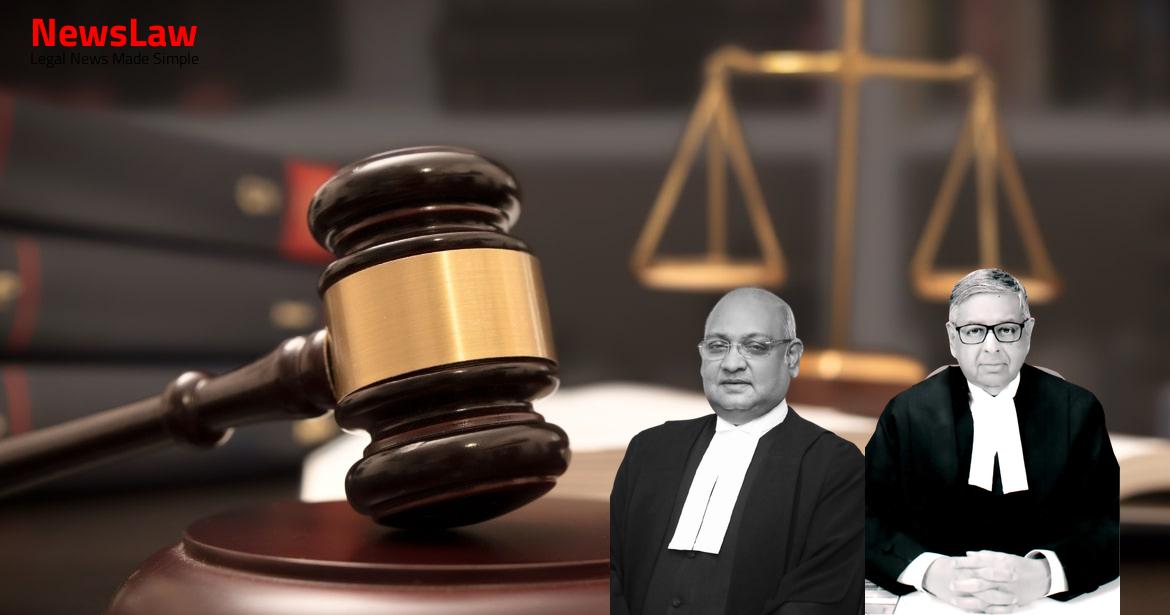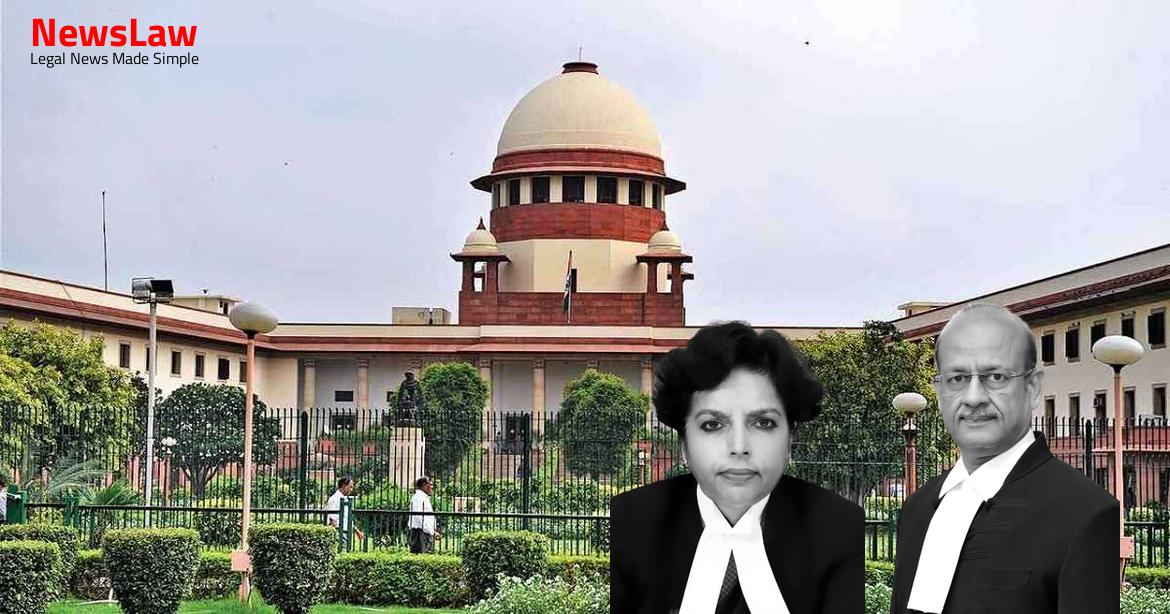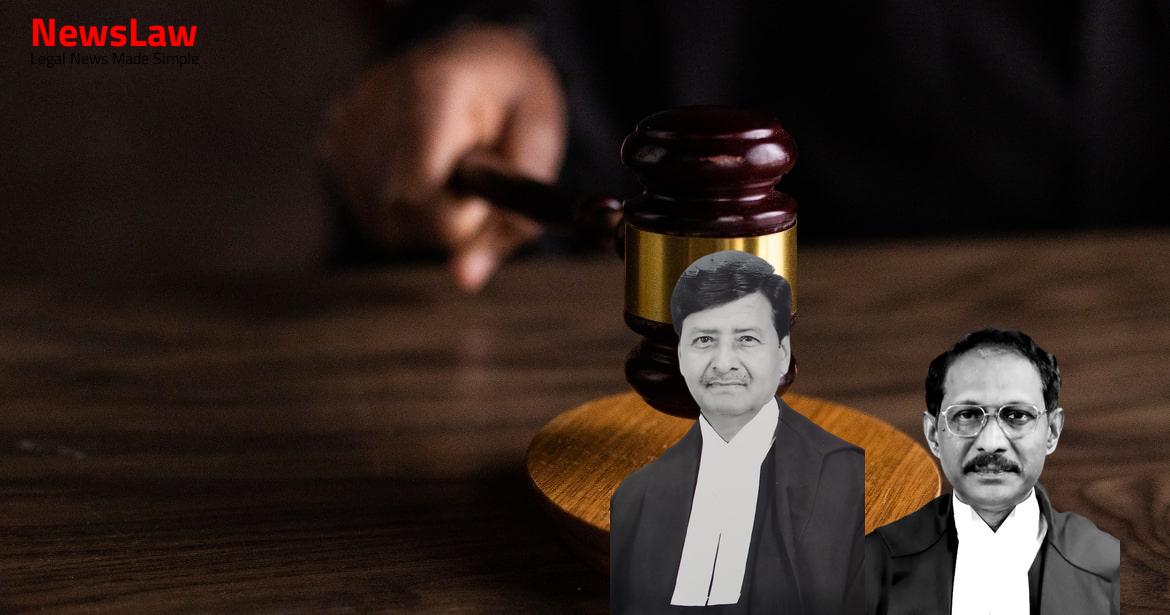Delve into the detailed legal analysis undertaken by the court in a recent bail grant related to the NDPS Act. The court’s scrutiny of the evidence, prosecution’s case, and relevant legal principles forms the core of the analysis. This summary focuses on the judicial considerations rather than the specific case details, providing insight into the nuanced legal reasoning behind the bail decision.
Facts
- The respondent allegedly hatched a criminal conspiracy with co-accused persons to falsely implicate Prabir Kumar De and Pamela Goswami under the NDPS Act out of personal grudge.
- The respondent financed the procurement of cocaine amounting to Rs. 8,50,000 by co-accused Amrita Singh @ Sweety.
- The contraband was procured from other co-accused Daim Akhtar and Farhan Ahmed and handed over to the respondent by Amrita Singh @ Sweety.
- Amrit Raj Singh was seen leaving the respondent’s house and later detained in connection with the case.
- Recovery and seizure of 76 grams of cocaine from a vehicle on 19.02.2021 resulted in the arrest of Prabir Kumar De, Pamela Goswami, and Somnath Chattopadhyay.
- A notice under Section 160 of CrPC and Section 67 of NDPS Act was issued to the respondent, leading to his challenge in WPA No. 5448 of 2021, which was dismissed by the High Court.
- Police faced obstructions from CISF personnel at the respondent’s residence, leading to the seizure of a hard disk with deleted data.
- The respondent was detained and arrested at Galsi PS, Purba Bardhaman in the State of West Bengal on 23.02.2021.
- The respondent allegedly engaged Amrit Raj Singh to lure Prabir Kumar De and Pamela Goswami for a meeting with a senior political leader in connection with the Legislative Assembly elections.
- The High Court opined that the restrictions of Section 37 NDPS Act would not apply in this case.
- The accused-respondent had been in custody since 23.02.2021.
- The High Court granted bail to the accused-respondent with stringent conditions.
- Conditions of the bail included a bond of rupees one lakh with four sureties, reporting to the Officer-in-Charge once a week, restrictions on travel outside West Bengal without court permission, and surrendering the passport immediately.
Also Read: Ensuring Maintenance Rights: Court’s Legal Analysis
Arguments
- The petitioner, through the learned senior counsel, contends that the respondent enjoys political clout in West Bengal, raising concerns of witness influence and evidence tampering.
- The High Court’s failure to consider relevant facts and interpretation of Section 37 NDPS Act are highlighted as errors by the senior counsel.
- The High Court’s considerations for bail, including the absence of contraband possession by the respondent and changes in the prosecution case, are argued to be valid.
- The respondent’s criminal background of 53 cases, including threats to public servants, is emphasized by the senior counsel.
- Instances of the respondent’s threatening behavior, attempts to abscond, and violent conduct during legal proceedings are pointed out.
- The senior counsel argues that the respondent financed drug trafficking activities, harbored offenders, and is supported by witness statements and evidence.
- The senior counsel challenges the High Court’s decision to grant bail to the respondent and asserts that the High Court disregarded key facts and legal principles.
- The respondent’s involvement in a drug peddling racket, attempts to escape, and history of threatening behavior are reasons cited against granting bail.
- The Advocate General supports the strict enforcement of NDPS Act to combat drug trafficking and highlights the accusations and evidence against the respondent.
- Various legal precedents and cases are referred to by both sides in arguing for and against the grant of bail to the respondent.
- The witnesses Md. Nasir Khan and Nishat Alam @ Ruman Khan, who provided statements, are convicts in a rape case and had been released from jail only 2-3 months prior to the incident.
- The charge under Section 27A NDPS Act may not apply as the alleged act was a solitary transaction motivated by revenge, not drug peddling.
- There is a lack of prima facie evidence to suggest the respondent planted contraband in the motorcar of the main accused persons.
- The respondent, a well-known political leader, has multiple cases filed against him by the State police, but none involved offenses related to the NDPS Act.
- The respondent’s involvement in a previous case was limited to a conviction under Section 353 IPC, with appeals pending and interim relief granted in related matters.
- The prosecution’s case is challenged as concocted, with no connecting material available, and allegations of data tampering from CCTV footage at the respondent’s residence are disputed.
- The timing of the police raid and search at the respondent’s house and office is questioned, with no contraband found.
- The complaint about contraband recovery from the motorcar occupants raises doubts about the prosecution’s case’s credibility, especially when the occupants supposedly knew about the concealed cocaine.
- Argues that for Section 27A NDPS Act to apply, regular engagement in illegal activities is required, not a one-time event, and since nothing was found with the respondent or under his control, the charge may not hold.
- The respondent’s cooperation with authorities, providing location details, refutes claims of absconding, and questions the reliability of witness statements not included in the charge-sheet or trial court record.
Also Read: Analyzing Evidentiary Value in Criminal Conviction Case
Analysis
- The respondent’s involvement in the offence under Section 27A NDPS Act is doubted, as the story of contraband being planted is questionable.
- The prosecution case against the respondent appears weak as no contraband was found in his possession or control.
- The statements of motorcar occupants give rise to doubts and more questions than answers regarding the alleged conspiracy.
- The High Court’s view that the respondent may not have committed the charged offence is supported by the lack of recovery and questionable prosecution story.
- The change in the prosecution’s case from the initial FIR raises serious doubts about the veracity of the charges against the respondent.
- The application for bail was granted based on the doubt in the prosecution’s case and the respondent’s past history.
- Further analysis on drug trafficking and harbouring of offenders need not be undertaken due to doubts in the planting of contraband story.
- Refusal of the petitioner to furnish voice sample may or may not have an adverse effect on his case at the trial
- Consciousness about the salutary object of the NDPS Act and consideration of the decision in State of Kerala v. Rajesh
- Reference to the Bombay High Court decision in Criminal Bail Application (Stamp) No 2386 of 2020 (Reha Chakraborty v. The Union of India State of Maharashtra)
- None of the 53 criminal cases pending against the petitioner is under the provisions of the NDPS Act
- Petitioner has criminal antecedents but no history of dealing in narcotics under the NDPS Act
- Recognition of the need to deal with illegal drug trafficking with severity due to its deleterious effects on society
- The observations made in the judgment are only of prima facie view and relevant for the purpose of the question of grant of bail.
- The Trial Court will take the final decision after the trial, and these observations will not have any bearing on that.
- Prosecution can seek imposition of further conditions or even cancellation of bail if the respondent faults in adhering to the current conditions.
- There is no reason to interfere in the High Court’s order granting bail to the respondent with specific conditions.
Also Read: Legal Authority and Res Judicata in Representation Matter
Decision
- The restriction in Section 37 of the NDPS Act does not apply in this case.
- The petitioner qualifies for bail due to the nature of the alleged offence, the material on record, and the duration of custody.
- The petitioner, Rakesh Singh @ Rakesh Kumar Singh, is granted bail upon fulfilling specific conditions.
- Conditions include furnishing a bond of Rs. 1,00,000/- and four sureties of Rs. 50,000/- each, reporting to the Officer-in-Charge once a week, appearing before the trial court on every hearing date, refraining from intimidating witnesses or tampering with evidence, not traveling outside West Bengal without court permission, and surrendering his passport to the trial court.
Case Title: STATE OF WEST BENGAL Vs. RAKESH SINGH @ RAKESH KUMAR SINGH (2022 INSC 691)
Case Number: Crl.A. No.-000923-000923 / 2022



